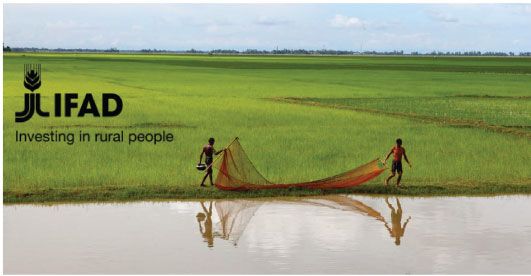- info@ficci.org.bd
- |
- +880248814801, +880248814802
- Contact Us
- |
- Become a Member
- |
- |
- |
- |
- |
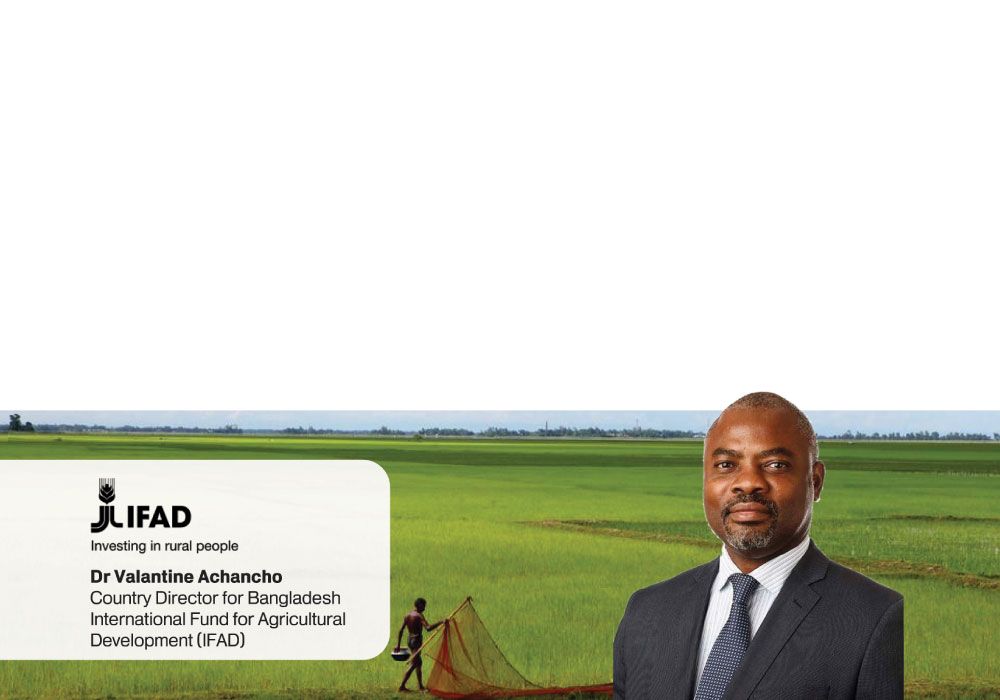
The International Fund for Agricultural Development (IFAD) is a specialized agency of the United Nations, and an International Financing Institution (IFI), established in 1977 with a singular mission: to alleviate rural poverty and hunger. Created in response to the global food crisis of the early 1970s, IFAD was envisioned as a mechanism to channel resources into rural areas, recognizing that small-scale farmers and rural communities are critical to global food security and economic stability. Since its inception, IFAD has remained steadfast in its focus on empowering the most marginalized populations, ensuring their participation in sustainable development processes.
Transforming Rural Economies: IFAD's Vision
In Bangladesh, IFAD has been instrumental in rural transformation over the past 45 years, investing $1.16 billion in concessional financing across 39 projects, leveraging a total of $4.27 billion with cofinancing from international and domestic partners. These projects have directly benefitted 11.7 million households. IFAD's focus has been on smallholder farmers, rural women, and youth, often excluded from mainstream development. Its interventions have improved agricultural productivity, access to finance and markets, and rural infrastructure, while enhancing climate resilience and livelihoods for vulnerable communities.
IFAD's work aligns with Bangladesh's development priorities for rural transformation, as agriculture contributes around 13% to GDP and employs nearly 40% of the workforce. The Country Strategic Opportunities Programme (COSOP) for 2023-2028 which gives the strategic direction for IFAD engagement with the government of Bangladesh under this period focuses on two main areas: strengthening climate adaptation and mitigation for rural communities and improving access to finance, technology, and markets. These efforts aim to diversify rural economies and create employment opportunities.
IFAD's approach emphasizes inclusive and sustainable development, investing not only in infrastructure but also in the human and social capital of rural communities. By enabling access to modern agricultural technologies and fostering innovative financing, IFAD's projects create lasting impacts, contributing to the broader development goals of Bangladesh. Through its extensive portfolio, IFAD investments create inclusive economic growth in rural populations, improving their lives through integrated development interventions.
Elevating Agribusiness: Lessons from the Rural Microenterprise Transformation Project [Total project cost is US$ 200 million, of which US$ 81 million financed by IFAD, project duration: 2019-20251
Agribusiness is a crucial lifeline for millions in Bangladesh. The Rural Microenterprise Transformation Project (RMTP), implemented by the Palli Karma Shahayak Foundation (PKSF) and its Partner Organizations (PO), takes a holistic approach to strengthen value chains and improve the livelihoods of smallholder farmers and microentrepre- neurs. By connecting rural producers to high-demand markets, the project fosters growth, sustainability, and food security.
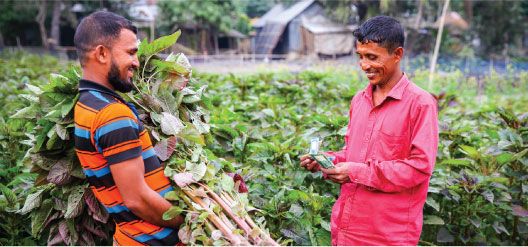
RMTP empowers over 534,000 beneficiaries, 57% of whom are women. Small farmers and entrepreneurs receive training, farming tools, and financial resources to thrive in competitive markets. Over 14,000 youth have been trained in advanced agricultural techniques and international standards like Good Agricultural Practices (GAP) and Hazard Analysis and Critical Control Points (HACCP), which help producers meet domestic and global market demands. These interventions have resulted in a 25% average profit increase for supported microenterprises.
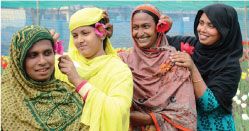 Financial inclusion plays a key role in RMTP's success. Nearly 76,000 microenterprises, mostly led by women, have gained access to financial products, enabling them to scale their businesses, adopt modern technologies, and embrace innovation. These loans help rural microentrepreneurs to participate in higher-value markets, generating employment and improving local economies. Through these interven- tions, the average loan size has increased by 53%, demon- strating the impact of combining value chain support with financial access.
Financial inclusion plays a key role in RMTP's success. Nearly 76,000 microenterprises, mostly led by women, have gained access to financial products, enabling them to scale their businesses, adopt modern technologies, and embrace innovation. These loans help rural microentrepreneurs to participate in higher-value markets, generating employment and improving local economies. Through these interven- tions, the average loan size has increased by 53%, demon- strating the impact of combining value chain support with financial access.
Collaboration with the private sector is central to RMTP's success. Partnerships with companies like PRAN, Milk Vita, and Bengal Meat have secured markets for farmers and ensured fair prices. Contract farming arrangements have offered guaranteed markets and income stability. The project also utilizes digital tools, including blockchain for traceability and e-commerce platforms, enhancing market access and transparency. These innovations bridge the gap between rural producers and consumers, transforming traditional agribusiness models.
RMTP fosters grassroots entrepreneurship by developing microenterprises in sectors like livestock, dairy, fisheries, and horticulture. By improving packaging, processing, and retailing, the project ensures a steady supply of essential goods such as seeds, fertilizers, and veterinary products and strengthens rural value chains, creating new income streams within communities.
Integrating Nutrition and Economic Empowerment: The RAINS Project [Total project cost is US$ 31.14 million, of which US$ 16 million is managed by IFAD from a Global Agriculture and Food Security Program (GAFSP) grant, project duration: 2023 to 2025]
IFAD's approach goes beyond market access to address key needs like food security and nutrition. The RAINS project, in collaboration with the Ministry of Agriculture, highlights this focus. It distributed over 13,000 Homestead Vegetable Gardening kits to women, including seeds, fertilizers, and training, resulting in an 11% improvement in dietary diversity among participating households.
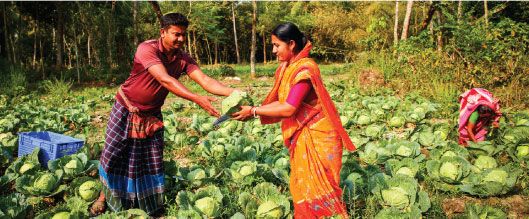
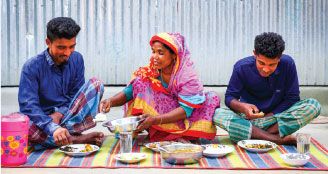 These kits optimized growing seasons, introduced new crops, and generated surplus for local markets. Women, equipped with new skills, have become powerful agents of change, improving household income and well-being. Local agricultural officers have supported training and collaboration through produc- er groups. This integrated model has not only enhanced food security but also transformed subsistence farmers into entrepreneurs, illustrating how targeted interventions can empower rural women, combat malnutrition and strengthen local
These kits optimized growing seasons, introduced new crops, and generated surplus for local markets. Women, equipped with new skills, have become powerful agents of change, improving household income and well-being. Local agricultural officers have supported training and collaboration through produc- er groups. This integrated model has not only enhanced food security but also transformed subsistence farmers into entrepreneurs, illustrating how targeted interventions can empower rural women, combat malnutrition and strengthen local
economy. Many of these targeted project beneficiaries have demonstrated economic graduation through increased income, improved household assets and expanded access to education and health services.
Resilience Against Climate Challenges: Insights from the Promoting Resilience of Vulnerable through Access to Infrastructure, Improved Skills, and Information (PROVATI3) project [Total project cost is US$ 92.37 million, of which US$ 64.5 million is financed by IFAD. Project duration: 2017-2026]
In northern Bangladesh, where climate vulnerability is acute, the Promoting Resilience of Vulnerable through Access to Infrastructure, Improved Skills, and Information (PROVATI3) project, implemented in partnership with the Local Government Engineering Department (LGED), has been a lifeline. Addressing climate adaptation and livelihood enhancement, it ensures rural communities are prepared for the future.

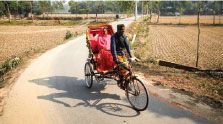 The project has introduced a flood warning system covering 19 Upazilas, providing timely information to at-risk communities, significantly reducing disaster-related losses and improving preparedness to respond to floods and other climate-induced risks.
The project has introduced a flood warning system covering 19 Upazilas, providing timely information to at-risk communities, significantly reducing disaster-related losses and improving preparedness to respond to floods and other climate-induced risks.
PROVATI3 has also focused on infrastructure development. It has rehabilitated over 210 kilometres of rural roads, built 135 rural markets, and 30 multi-purpose flood shelters, improving access to essential services and providing safe spaces during emergencies.
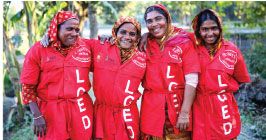 Many of these infrastructures are constructed and maintained by the local communities using the Labour Contracting Society (LCS) model, which generates employment and supports vulnerable populations. These efforts integrate disaster preparedness with long-term development.
Many of these infrastructures are constructed and maintained by the local communities using the Labour Contracting Society (LCS) model, which generates employment and supports vulnerable populations. These efforts integrate disaster preparedness with long-term development.
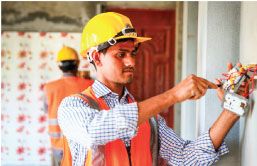 In addition to disaster resilience, the project emphasizes livelihood development for sustainability. Vocational training has reached 30,000 individuals, with a 97% passing rate and 70% securing employment. The Gender Action Learning System (GALS) training empowers rural households with skills in financial literacy, business management, and sustainable practices, particularly benefiting women and youth.
In addition to disaster resilience, the project emphasizes livelihood development for sustainability. Vocational training has reached 30,000 individuals, with a 97% passing rate and 70% securing employment. The Gender Action Learning System (GALS) training empowers rural households with skills in financial literacy, business management, and sustainable practices, particularly benefiting women and youth.
The construction of rural markets has bolstered local economies, offering farmers and traders improved facilities and fostering community interaction. A recent study found that the project contributed to a 70% increase in household asset ownership, showcasing the tangible impact of PROVATI3 in strengthening both economic and social resilience.
Partnering for Impact: A Collaborative Approach
What sets IFAD apart is its commitment to partnerships. Collaboration with the private sector ensures agribusiness- es are sustainable and profitable. By integrating private manufacturers and service providers into value chains, IFAD creates a self-sustaining ecosystem where all stakeholders benefit.
Government partnerships align projects with national priorities, ensuring scalability and long-term viability. At the same time, IFAD leverages the expertise of development partners to address systemic challenges, from financial inclusion to climate adaptation. These multi-stakeholder collaborations amplify the impact of every dollar invested, creating a model inclusive growth that can be replicated elsewhere.
IFAD partners with multilateral organizations like the World Bank and Asian Development Bank as well as bilateral development partners like the Netherlands, Denmark, technical cooperation, UN agencies such as the Food and Agriculture Organization (FAO) and World Food Programme (WFP). It also collaborates with other international institu- tions such Global Alliance for Improved Nutrition (GAIN), Consortium of International Agricultural Research Centers (CGIAR) etc.
 A key contribution is IFAD's ability to bridge tradition and technology. By introducing innovations like blockchain and e-commerce, IFAD helps rural communities access global markets while preserving their cultural and agricultural heritage. These partnerships open opportunities for scaling successful models, ensuring innovation benefits even the most remote
A key contribution is IFAD's ability to bridge tradition and technology. By introducing innovations like blockchain and e-commerce, IFAD helps rural communities access global markets while preserving their cultural and agricultural heritage. These partnerships open opportunities for scaling successful models, ensuring innovation benefits even the most remote
areas.
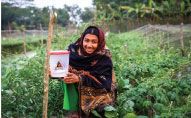 A Blueprint for the Future
A Blueprint for the Future
IFAD's investments in Bangladesh showcase the power of innovation and collaboration. By combining tradition with technology, IFAD helps rural communities not only overcome today's challenges but also thrive in a changing world. Success stories, such as microentrepreneurs growing their businesses and women leading in agriculture, highlight the potential of rural communities when given the right tools and opportunities.
Through its comprehensive agribusiness approach, IFAD demonstrates that sustainable rural development is achiev- able. By building resilient value chains, promoting climate-smart practices, and fostering inclusive partnerships, IFAD is driving a prosperous rural economy in Bangladesh.
As Bangladesh faces challenges like climate change, population growth, and economic inequality, IFAD's work offers a model for sustainable development. Its projects show that with investments in people, infrastructure, and innovation, rural communities can contribute to national progress. Focused on marginalized groups, especially women and youth, IFAD ensures that development is inclusive and leaves no one behind.
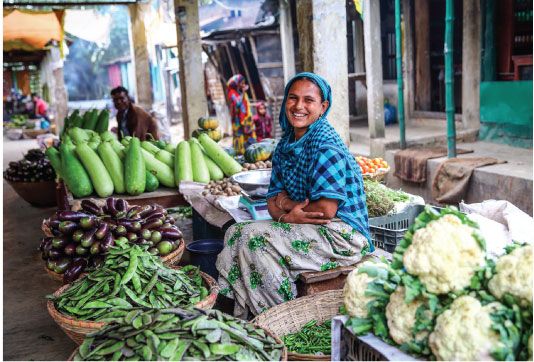
Looking ahead, IFAD's commitment to collaboration, adaptation, and innovation will continue to be central to its mission. By empowering rural communities and promoting inclusive growth, IFAD is not only addressing current challenges but also laying the foundation for a sustainable and prosperous future for millions of people in Bangladesh.
